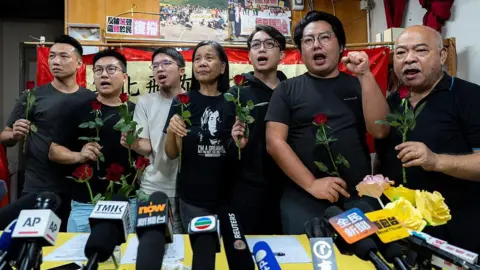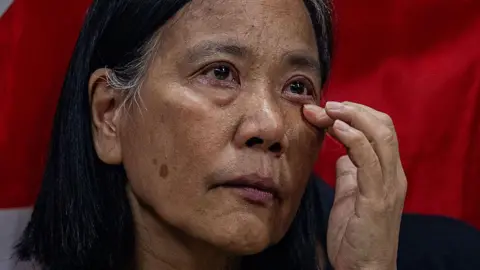One of Hong Kong's last major pro-democracy parties disbands
 Getty Images
Getty ImagesOn the wall of the League of Social Democrats office, the Chinese characters for freedom are spelt out with court admission slips.
Members of the party take turns speaking into a microphone connected to a loudspeaker. They stand in front of a banner that reads "rather be ashes than dust", written in Chinese. Founded close to 20 years ago, the party is known as the last protest group in Hong Kong.
"The red lines are now everywhere," Chan Po Ying, the chair of the party, tells the BBC.
"Our decision to disband was because we were facing a lot of pressure."
She added that everything in Hong Kong has become politicised, and she was not in a position to go into more detail to elaborate the reasons.
 Getty Images
Getty ImagesThe party is the third major opposition party to disband this year in Hong Kong. The group known for its street protests said it had made the decision after "careful deliberation" and to avoid "consequences" for its members.
The announcement to disband comes just days ahead of the fifth anniversary of the Beijing-imposed national security law. The party said it could not elaborate on the timing of its closure, but said it faced "intense pressure."
"Over these 19 years, we have endured hardships of internal disputes and the near-total imprisonment of our leadership, while witnessing the erosion of civil society, the fading of grassroots voices, the omnipresence of red lines, and the draconian suppression of dissent," it said in a statement.
The authorities said the national security law was needed in order to restore order after a year of often violent protests in 2019. But five years on, critics say it has been used to dismantle the political opposition.
In June, a Chinese official claimed hostile forces were still interfering in the city.
"We must clearly see that the anti-China and Hong Kong chaos elements are still ruthless and are renewing various forms of soft resistance," Xia Baolong said in a speech.
The national security law criminalises charges such as subversion. In 2024 Hong Kong passed a domestic national security law known as Article 23, criminalising crimes such as sedition and treason. Today the majority of Hong Kong's political opposition have either fled the territory or have been detained.
"I think it's no longer safe to actually run a political party. I think the political rights have almost totally gone in Hong Kong," vice-chairman Dickson Chau told the BBC.
On 12 June, three members were fined by a magistrates' court for hanging a banner at a street booth while collecting money from the public without permission.
Critics say opposition groups face political persecution. Chau says the party's bank accounts were closed in 2023. Over the last five years, six party members have been imprisoned.
"A place without any meaningful political party, then people sooner or later will forget how strong they are going to be if they can group together and voice out in a collective manner," said Chau.
"If I do nothing then why am I here in Hong Kong?".
He said even if he was not politically active, he feared he could still find himself a target of the police and be pressured to leave Hong Kong by the authorities.
"The future is very difficult as a citizen. If you want to exercise your right as a citizen it's very difficult. Not only for the politician or the activist, even the ordinary people need to think twice," said Chau.
"It's a dilemma I didn't expect to face in Hong Kong for just being an activist," he added.
